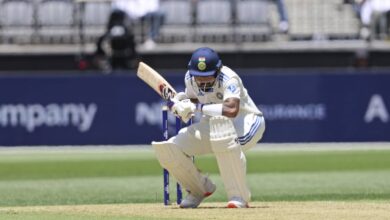No more going to court over selection or sports adminration matters, if govt bill becomes law | Sport-others News

If a draft sports governance bill becomes a law, India’s athletes and officials will no longer be able to take their sporting disputes to the country’s courts. Instead, they will first have to knock on the doors of a proposed Appellate Sports Tribunal, modelled on the international Court of Arbitration for Sport (CAS). Only if they are dissatisfied with the verdict, can they approach the Supreme Court.
This isn’t the only eye-catching recommendation in the Draft National Sports Governance Bill, 2024, which the sports minry released on Thursday.
It has been suggested that a Sports Regulatory Board of India (SRBI) be formed to primarily look into all the governance issues related to sports federations. If implemented, this would result in a separation of powers within the sports minry, which right now is responsible for all matters concerning Indian sport — from funding to governance — and has been criticised for not enforcing the rules strictly.
Additionally, the draft bill could also pave the way for any citizen of India above the age of 25 to contest for the top posts in a federation election as long as there is a proposer and a seconder. Currently, candidates vying to become office-bearers have to be serving within the system, either in a federation’s executive council or with a member association.
The proposed Tribunal, meanwhile, will be formed to ensure the courts aren’t burdened with sports cases going forward. Over the years, it’s become a ritual of sorts that before every multi-discipline Games or a World Championship, aggrieved athletes approach a High Court blaming an alleged faulty selection process. At the same time, the courts are also hearing governance-related cases.
In October alone, six national federations are likely to appear in front of the Delhi High Court due to governance-related issues. If the Parliament clears the Draft Bill, this could become a thing of the past.
According to Section 29 of the proposed bill, all pending court cases will be transferred to the tribunal on a date specified the government. ‘The matters transferred to the Appellate Sports Tribunal under sub-section (1) may be heard and adjudicated from the stage at which such dispute was pending in the court or the authority, as the case may be or hear the matter afresh if it so deems appropriate,’ the draft states.
Section 30 adds that ‘no civil court shall have jurisdiction to entertain any suit or proceeding in respect of any matter on which the Appellate Sports Tribunal is empowered… and no injunction shall be granted any court or other authority in respect of any action taken or to be taken in pursuance of any power conferred or under this Bill.’
The appellant can, however, appeal against the Tribunal’s decision to the Supreme Court within 30 days of the verdict.
The composition of the Tribunal and its benches, the draft states, shall be prescribed the Central Government. The selection of the Tribunal, it adds, will be made the government on the recommendations of a selection committee comprising a ‘retired Supreme Court or High Court judge, sports secretary and secretary (law) or his/her nominee’.
‘An order passed the Appellate Sports Tribunal under this Bill shall be executable the Appellate Sports Tribunal as a decree of civil court, and for this purpose, the Appellate Sports Tribunal shall have all the powers of a civil court,’ reads Section 33.







